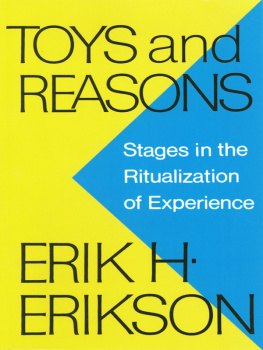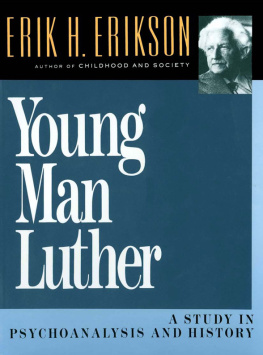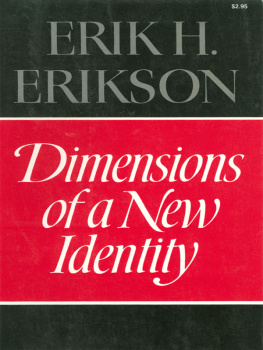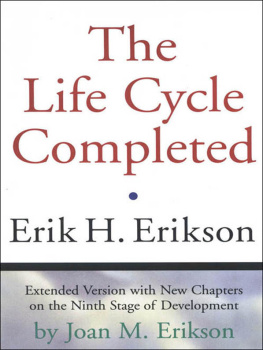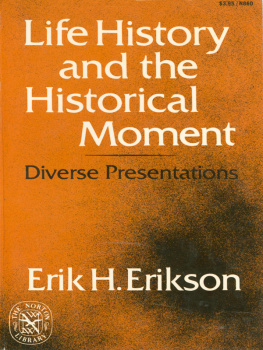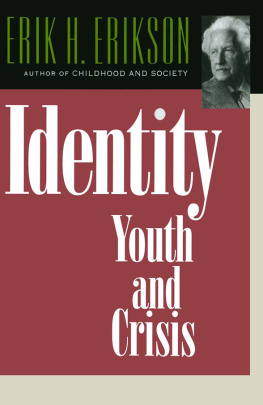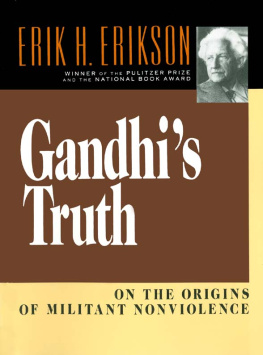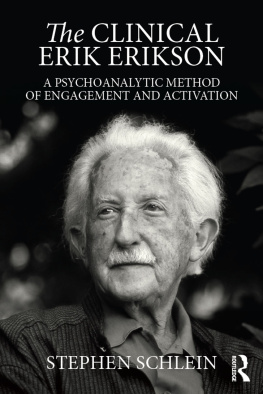Erik Erikson - Erik Erikson - Identity and the Life Cycle
Here you can read online Erik Erikson - Erik Erikson - Identity and the Life Cycle full text of the book (entire story) in english for free. Download pdf and epub, get meaning, cover and reviews about this ebook. genre: Romance novel. Description of the work, (preface) as well as reviews are available. Best literature library LitArk.com created for fans of good reading and offers a wide selection of genres:
Romance novel
Science fiction
Adventure
Detective
Science
History
Home and family
Prose
Art
Politics
Computer
Non-fiction
Religion
Business
Children
Humor
Choose a favorite category and find really read worthwhile books. Enjoy immersion in the world of imagination, feel the emotions of the characters or learn something new for yourself, make an fascinating discovery.

- Book:Erik Erikson - Identity and the Life Cycle
- Author:
- Genre:
- Rating:3 / 5
- Favourites:Add to favourites
- Your mark:
- 60
- 1
- 2
- 3
- 4
- 5
Erik Erikson - Identity and the Life Cycle: summary, description and annotation
We offer to read an annotation, description, summary or preface (depends on what the author of the book "Erik Erikson - Identity and the Life Cycle" wrote himself). If you haven't found the necessary information about the book — write in the comments, we will try to find it.
Erik Erikson - Identity and the Life Cycle — read online for free the complete book (whole text) full work
Below is the text of the book, divided by pages. System saving the place of the last page read, allows you to conveniently read the book "Erik Erikson - Identity and the Life Cycle" online for free, without having to search again every time where you left off. Put a bookmark, and you can go to the page where you finished reading at any time.
Font size:
Interval:
Bookmark:


PSYCHOLOGICAL ISSUES
Vol. I, No. 1 1959 Monograph
IDENTITY AND THE LIFE CYCLE Selected Papers by
ERIK H. ERIKSON
n
With a Historical Introduction by DAVID RAPAPORT
INTERNATIONAL UNIVERSITIES PRESS, INC. 227 West 13 Street New York 11, N. Y.
Copyright 1959, by International Universities Press, Inc.
Editorial Statement
Psychological Issues will publish diversified source materials for a general psychoanalytic theory of behavior. The Editors believe this new kind of publication outlet is needed, for in the last twenty-five years psychoanalytic interest has ranged with profit far beyond psychopathology, unconscious fantasy life, and the therapeutic process. As Heinz Hartmann has put it, We no longer doubt that psychoanalysis can claim to be a general psychology in the broadest sense of the word, and our conception of the working methods which may properly be considered psychoanalytic has become broader, deeper, and more discriminating. This means that to develop its theoretical potentialities psychoanalysis must scrutinize data from all fields of psychological and psychiatric inquiry.
The advances in ego psychology during the last quarter of a century are good examples of how psychoanalytic theory has broadened in scope and altered in perspective. Issues of structure formation and its change, and of adaptation and reality have become increasingly important to psychoanalysis. Concomitantly, important revisions have evolved in its developmental propositions. In this connection Piaget's work and that of the ethologists have aroused psychoanalytic interest; so have studies of the mechanics of thought, and of perception and learning as tools of adaptation. Further theoretical advance requires not only new concepts to illuminate familiar clinical data but also new types of data gathered by nontherapeutic methods. For example, detailed and systematic probing of certain crucial aspects of perceptual and cognitive processes is not possible in the treatment situation and yet is required for the further development of psychoanalytic ego psychology.
Psychological Issues will reflect this broadened view of relevant working sources for psychoanalytic theory. In our opinion, relevant contributions can come from experimental studies as well as from clinical ones, from controlled developmental studies as well as from the genetic explorations of psychoanalytic therapy itself. Indeed, source materials need not be explicitly psychoanalytic in point of view to make a contribution to the theory. It is only necessary that the data presented and the problems clarified amplify a schematic proposition here, fill a gap there, or suggest a productive revision of theory in another place.
While the Editors are concerned with the advancement of psychoanalytic theory, they will try to make Psychological Issues of interest to investigators of all theoretical persuasions in psychology, psychiatry, and related fields. The Editors hope to publish monographs that contain fresh and penetrating observations of behavior and confront fundamental psychological issues. It is through this dedication to the presentation of phenomena bearing on basic issues that Psychological Issues should serve as a meeting ground for all serious investigators of behavior.
Those readers who are particularly concerned with psychoanalytic theory will come into contact with important research not ordinarily presented in psychoanalytic journals. Because in some instances the investigation will have been carried out without any concern for psychoanalysis, its pertinence to psychoanalytic theory might not be readily apparent. On each such occasion a specially prepared introduction by an invited contributor will illuminate the perspectives of psychoanalytic theory that compelled the Editors interest in the particular monograph.
Psychological Issues will be devoted largely to contributions of monographic length. The strains of present-day publication practices have tended to squeeze out the monograph-length contribution which allows for leisurely and thorough presentation of data and ideas. Authors have been under pressure either to inflate their contributions to a book format or to shrivel them into the brevity of a journal article. Consequently many contributions are unavailable to the scientific public in their optimal form. The justifiably lengthy contribution will have a leading place in Psychological Issues. Some monographs will be translations from a foreign language; others will republish papers by a distinguished author that are out of print or scattered and not easily obtained for systematic study.
The Editors do not regard readability and grace of style as unessential if welcomed assets. Psychological Issues will strive for the
ideal that every contribution should be rewarding to read for its style as well as its substance.
In its selection of monographs the Board of Editors will in all instances be governed by its current definition and appraisal of the status and nutritional requirements of general psychoanalytic theory. Therefore the Board will consider only contributions submitted on invitation. There is at present no provision for its consideration of unsolicited manuscripts.
The Editorial Board is happy that its partner in this venture is International Universities Press, an organization long associated with the publication of psychoanalytic literature.
Psychological Issues will publish four monographs per volume. These will appear irregularly during the calendar year. The Journal will be sold mainly by subscription ($10.00 per Volume). Single issues will be purchasable and will be priced individually.
Subscriptions should be sent directly to the publisher, International Universities Press, Inc., 227 West 13 Street, New York 11, N. Y. Editorial correspondence should be sent to the Editor, Dr. George S. Klein, Research Center for Mental Health, New York University, Washington Square, New York 3, N. Y.
CONTENTS
IDENTITY AND THE LIFE CYCLE
Author's Preface
The republication of selected papers usually calls for a statement of sufficient reason. This monograph contains writings which are in demand as source materiala demand so persistent and coming from such different professional quarters as to point to a live psychological issue.
The title states the over-all issue: It is the unity of the human life cycle, and the specific dynamics of each of its stages, as prescribed by the laws of individual development and of social organization. In psychoanalysis this theme has so far not been carried beyond childhood, and a few papers cannot aim to do more than to delineate the specific psychosocial task of youth, namely, the formation of ego identity, and to outline work as yet to be done. The editor and the author are, therefore, especially grateful to David Rapaport for permitting them to publish as an introductory chapter a comprehensive paper which serves to anchor the issue in the history of psychoanalytic ego theory and in the work of my teachers. However, the reader who is not specifically prepared by previous study to follow Rapaports treatment of the subject may do well to turn to it after having perused my less systematic papers.
The nature of these papers explains their varying commitment to theory. The first paper (a selection of clinical notes which antedated and, in fact, provided source material for my book Childhood and Society ) illustrates that combination of therapeutic observations and impressions from applied work which leads a clinician to a rethinking of his premises. Application here does not mean only the use of psychoanalytic hypotheses in other fieldssuch as Indian education, war work, and longitudinal child studybut a sharing of the conditions of observation in these fields. The clinician approaches such episodical opportunities for communication and service with whatever theory has become implicit in his observa-
Font size:
Interval:
Bookmark:
Similar books «Erik Erikson - Identity and the Life Cycle»
Look at similar books to Erik Erikson - Identity and the Life Cycle. We have selected literature similar in name and meaning in the hope of providing readers with more options to find new, interesting, not yet read works.
Discussion, reviews of the book Erik Erikson - Identity and the Life Cycle and just readers' own opinions. Leave your comments, write what you think about the work, its meaning or the main characters. Specify what exactly you liked and what you didn't like, and why you think so.



